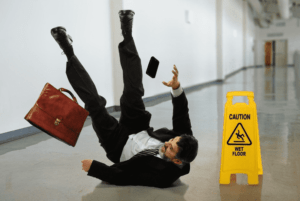
If you’re injured in a slip and fall accident, it’s essential to have proof of the property owner’s negligence.
Nothing hurts your case more than evidence to the contrary.
Take the case of a Florida woman who sued Walmart for $1.5 million after she said she slipped on a puddle in the store. Store video captured of her fall and other customers walking in the same space just before the accident showed no signs of a puddle.
The plaintiff lost, despite still having to contend with injuries from her fall.
Proving Your Case
The crux of a slip and fall lawsuit lies with proving negligence on behalf of the property owner. You must have proof or chances of an outcome in your favor, whether a settlement or trial judgment, are slim. Property owners will argue some of the following:
- You were trespassing in the area where the accident occurred
- You weren’t paying attention or were distracted by conversation or technology, such as using a smartphone.
- You didn’t see a warning or danger signs.
Each state treats slip and fall accidents differently. In Florida, consider the state’s statute of limitations deadline for filing a slip and fall lawsuit and the “shared fault” rule. The latter refers to your right to recover compensation despite sharing some of the blame for the accident.
Statute of Limitations
Anyone injured in a slip and fall accident in Florida has two years to file a lawsuit. This deadline also applies to property damages in that accident, such as a busted computer, broken phone, or smashed jewelry.
Understanding Florida’s Modified Comparative Negligence Law
In Florida, the approach to determining fault in accident cases is guided by a “modified comparative negligence” system. Under this system, a plaintiff who is found to be more at fault for their own injuries than the defendant is generally not eligible to recover damages from the defendant.
Specifically, if a claimant is responsible for more than 50% of their own harm, they may not recover damages from any other party. This is a significant aspect of Florida’s negligence law, and may play a crucial role in the outcome of your compensation claim. However, it’s important to note that this modified rule does not apply to medical negligence claims.
More Slip and Fall News
Woman awarded $2M in slip and fall lawsuit
Jawdropping settlements becoming the norm in slip and fall claims

